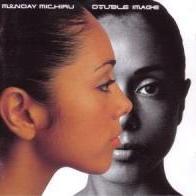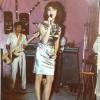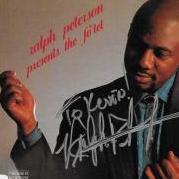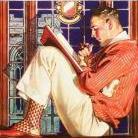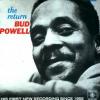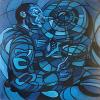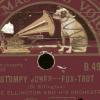‘Louis Armstrong’s America’ by Allen Lowe Review: An Original Tribute to a Titan
The saxophonist and scholar leads a shifting and artfully unruly ensemble on this two-volume set, taking inspiration from Armstrong’s own omnivorous musical appetite.
By Larry Blumenfeld
Four cymbal strikes establish a march beat, and then an eight-piece ensemble kicks in. A melody, played in unison by horns and reeds, is punctuated by growling trombone. “Mr. Jenkins’ Lonely Orphans Band,” the first track of Allen Lowe’s “Louis Armstrong’s America Vols. 1 & 2” (ESP Disk, out now), might place us back a century in time. Yet, 90 seconds in, a trombone solo slides up to one ringing note, which gets promptly and precisely matched by the bent tone of an electric guitar. Soon enough, that guitar solos wildly, with distortion worthy of good blues-rock, as the rhythm shimmies.
Mr. Lowe—whose brief tenor saxophone solo on that song displays his customary fluidity and humor—uses his Constant Sorrow Orchestra to bend senses of tone and time throughout this two-volume, four-CD release. That opening number is named for the Jenkins Orphanage, in Charleston, S.C., whose jazz band developed significant talents—including trumpeter Cat Anderson, of Duke Ellington’s orchestra—not too long after Armstrong, beginning in 1913, played in the Colored Waifs Home brass band in New Orleans.
The unruly beauty of Mr. Lowe’s music has long been grounded in specific lineages yet also consistently blurs styles and eras. Here, his original compositions embrace, among other things, Ellingtonia, punk rock, the Bo Diddley beat, free jazz, gospel-blues and bebop.
“But where does Louis Armstrong fit into all of this?” he asks in his liner note. Armstrong listened to everything: The handwritten playlists on his reel-to-reel mixtapes ran from opera to the Beatles, from far-flung folk music to all manner of jazz. Mr. Lowe isn’t alone in proposing Armstrong as “the first true post-modernist,” but the directive he draws from the trumpeter—“the past is the present, to be re-used and even abused”—is an entirely personal credo.
Mr. Lowe is a noteworthy historian, whose books are both eccentric and essential. In the introduction to his two-volume “‘Turn Me Loose, White Man,’ or: Appropriating Culture: How to Listen to American Music, 1900-1960,” he wonders: “Where does one start with American music, and where does one end? . . . Sometimes certain things seem to disappear, only to reappear as something else or something that seems like something else.” Case in point, his new composition “The Seven Foot Policeman,” which starts like a march yet slips easily into something like loft-era free-jazz without losing its essence.
Mr. Lowe thinks on an absurdly grand scale. His most recent book was more than 700 pages. His new release presents 69 original compositions, spanning more than five hours. His “orchestra” is 14 different ensembles, from duo to octet, drawn from a cast of 23 musicians. Somehow, none of this music sounds gratuitous or disjointed. And it tells a story, however circuitous: one man’s version of tradition.
Mr. Lowe isn’t the only historian on hand. Lewis Porter, who wrote the definitive biography of John Coltrane, plays both piano and Wurlitzer organ here, admirably balancing convention and invention on both. The piano playing of Loren Schoenberg, the National Jazz Museum in Harlem’s senior scholar, primarily known as a tenor saxophonist, is a shining revelation on several tracks, especially in duet with Mr. Lowe on “Under the Weather.”
The roster of pianists here runs deep. Ursula Oppens, best known in classical circles, lends spare and strange beauty to “Aaron Copland Has the Blues.” On “Red’s Revenge,” Danish pianist Jeppe Zeeberg captures the sense of “accelerating tempo, even while the time remains unchanged,” of Speckled Red, a pianist Mr. Lowe’s book championed with such a description.
Mr. Lowe’s playing is most affecting in duet with Matthew Shipp, a paragon of bold and searching modern pianism, especially on “The Sorrow Song: On the Cooling Board.”
Guitarist Marc Ribot, a singular master, displays a range of blues expression, from pious to greasy to proto-punk, on several tracks. Ray Suhy summons admirable power on electric guitar, too, yet most entrancing is his elegant weirdness on banjitar (a six-string banjo), especially on “Bathing With Doc Walsh.” Still, this album’s real achievement is the variety of ensemble sounds Mr. Lowe curates—their combination of cohesion and ragged edges—and his ability to straddle eras. On “Calling All Freaks,” his octet conjures legacies of both Luis Russell’s swing and Charles Mingus’s bop. On “Mr. Harney Turn Me Loose,” he and Mr. Shipp fold shards of a ragtime hit within something John Coltrane and McCoy Tyner might have played.
In books and social media, Mr. Lowe, who is 70 years old, gets cantankerous in response to lazy assumptions. Yet there’s a sweetness too, an earnestness—what Greil Marcus, in an introduction to “Turn Me Loose, White Man,” identified as his “mission” regarding the relationship “between people long dead and those listening to them now in disbelief that they could ever die.” The title of one new composition, “I Should Have Stayed Dead,” offered here in three distinct versions, alludes to Mr. Lowe’s own mortality: He recorded these tracks in between treatments and surgeries for sinus cancer. Yet this is the music of a wild-eyed optimist who shows no signs of slowing down.
Rare
Rare
Rare
Rare
Rare
_forumlogo.png.a607ef20a6e0c299ab2aa6443aa1f32e.png)


